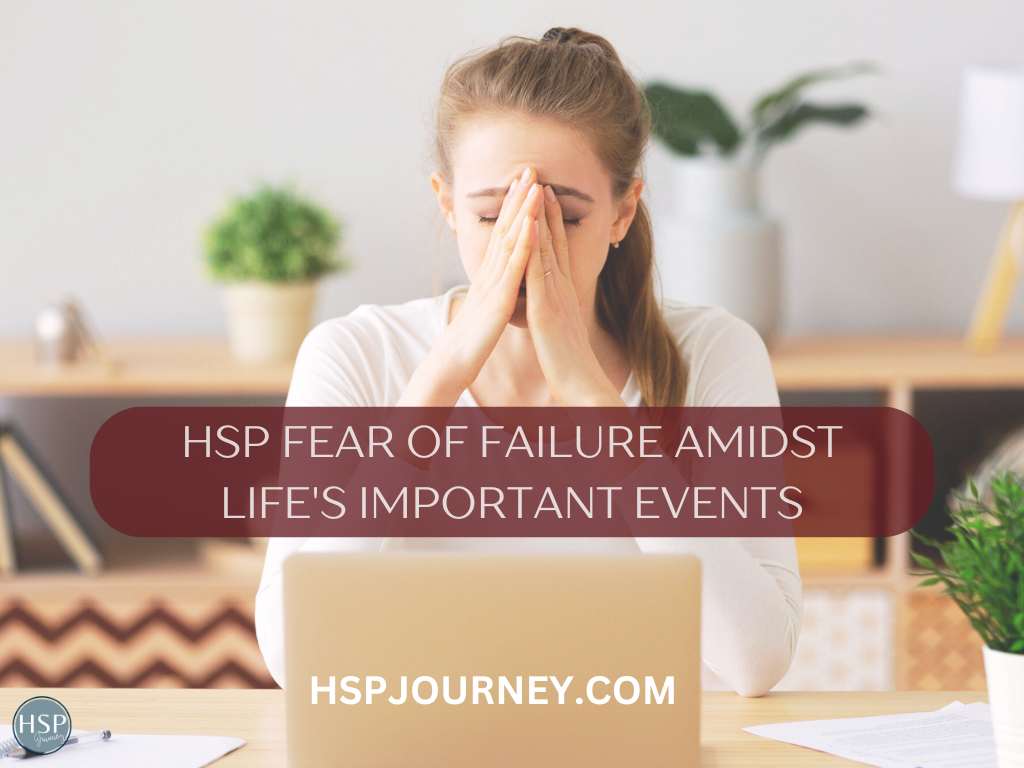One of the most significant obstacles for highly sensitive people (HSPs) to overcome in the face of life’s big challenges is our HSP fear of failure. Our sensitivity makes it very easy to tune into and very hard to avoid being overwhelmed by the thoughts, emotions, and physical sensations we associate with failing.
A client once described the fear of failure as “a runaway train that’s barreling for a washed-out bridge, and I’m powerless to stop it.” I think that encapsulates the experience for most of us when we feel powerless to deal appropriately with this fear. Our sensitivity makes us keenly aware of the sensations, thoughts, and emotions that arise for us when we contemplate failing.
Our culture seems to have very little empathy for how we experience the fear of failure specific to our sensitivity. We might be encouraged to take a “fake it ‘til you make it” approach. That is likely to be very unappealing to HSPs, since being inauthentic creates in us an inner tension that we naturally want to avoid.
We also are not well suited to the school of thought that throws someone into the deep end of the pool so they learn to swim. HSPs who are subjected to that experience learn to hate swimming (or whatever they’ve been pushed to do), because the experience floods our bodies, emotions, and minds, requiring an extensive effort to overcome that experience. Finally, we might be encouraged to change our way of thinking about failure or even avoid thinking about it entirely. I’ve never met an HSP who could overcome the fear of failure using these strategies, since deep thinking is one of our essential traits.

Table of Contents
Universal HSP Fear of Failure
If you haven’t thought much about it before, it may surprise you to hear that there are no situations that universally trigger fear of failure. Each of us has areas of our life in which we fear failing that others of us feel fully confident in doing. I think this is part of what leads to the lack of empathy we often experience if we express our fear of failure: if someone feels confident, they may think it should be easy to do a certain thing.
By the same token, we may underestimate how hard it may be for someone else to overcome a fear of failure if we have been able to do it for the same activity. Our fear of failure—and our way through it—is highly individualized.
So how can we come up with a gentle way forward when life hands us tough situations?
First, it is helpful to be curious about what is causing an HSP fear of failure to show up in each situation. Next, we can take look at the results of letting the fear of failure direct our behavior and decide whether those are consequences we want to accept for ourselves.
Once we have explored these topics, we can begin to make a highly personalized plan for dealing with a fear of failure. While these strategies can be useful to anyone, they are especially designed to honor what sensitive people need to make change without becoming overwhelmed.
Understanding the Causes of HSP Fear of Failure
Anxiety, Depression, and Trauma
If we are dealing anxiety or depression, those symptoms may heighten our belief that we should expect the worst and that we are destined to fail. Similarly, we may be more prone to a fear of failure if we have a history of trauma, if we believe something we did led to hard (whether other people may believe this to be true), or if we have been severely punished for past mistakes. The symptoms of anxiety, depression, and trauma make it easy to believe the voice inside us that fears failure and hard to effectively use coping strategies to overcome it.
People Pleasing
So many HSPs are also people pleasers. This makes sense: we are very sensitive to how uncomfortable it is when someone is unhappy with us. If we get caught in the trap of equating people pleasing with success, then trying to set boundaries or say no will also trigger a sense that we are failing. Additionally, in an effort to please others, we may push ourselves to do things we know are outside our comfort zone or our capacity to accomplish. When we then struggle or are unable to complete that task, it reinforces a nagging belief that we were destined to fail.
Perfectionism
In every perfectionist is a deep and abiding fear of failure. Perfectionism convinces us that anything less than 100% is catastrophic. And as with people pleasing, HSPs may be especially prone to perfectionism because it feels so good to do something perfectly and so uncomfortable if we do not. Perfectionism reinforces an underlying belief that the stakes are extremely high in everything we do, so we must seek to avoid failure at all costs.
Guilt and Shame
Recall that guilt is how you feel when you believe you have done something wrong, whereas shame is a sense that you as a person are wrong, bad, defective, or inadequate. In measured doses, guilt can help us to adjust our behavior so that it aligns with our beliefs. And shame is a common emotion among mammals that is meant to guide us to behave in ways that secure our place in our family and our social groups. The trouble is that guilt and shame can become too strong for HSPs, causing us to feel as though everything we do and everything we are is wrong. We then experience a fear of failure that has an intense staying power, particularly when shame is involved. It becomes difficult to sort out fact from fiction, so we default into the belief that we are doomed to fail.
The Ups and Downs that the Fear of Failure Brings
The only reason that the fear of failure exists in all human cultures is because it is serving valuable purposes. I would argue that it motivates us to be conscientious, work hard, think of how we are impacting others, and strive for innovation and excellence. These are noble values, necessary for the good of humanity.
The trouble is that the cost of these values can become too high for individual people. If our fear of failure gets too powerful, it can have the same kinds of negative effects as it was meant to protect us from. For instance, we might experience:
- Anxiety, depression, and other mental health symptoms both from the intensity of the fear of failure itself and from the consequences of how this fear shapes our behavior in undesirable ways
- Performance anxiety and imposter syndrome
- Relationship problems, disconnection from others, and difficulty asking for or accepting help and support from others
- Increased perfectionism
- Shame, guilt, and low self-esteem from to a pervasive sense of failing
- Procrastination, avoidance, and underperforming to minimize the risk failure
- Numbing and/or shutting down
- And of particular consequence to HSPs, a pattern of overthinking that leads to feeling overwhelmed and overstimulated

How to Cope with the Fear of Failure as an HSP
Most people would look at this list of ways that the fear of failure can impact us and agree that these are highly undesirable results. We may know that some of the things that trigger our fear of failure are our highest priorities: raising our kids well, managing our finances and careers, being a good spouse or partner. The people and activities we care most about call us to confront our fear of failure on a regular basis. But as HSPs, we need to figure out how to do that without burning ourselves out in the process.
So, what do we do?
Recognize the Universality of Fear of Failure and How it is Meant to Serve You
If we are able to recognize the ways that the fear of failure is meant to serve all people, we may find ourselves being less reactive to it. It is no longer something we have to drive out of ourselves entirely before we take action. Instead, the fear of failure can remind us of what we care about, who we want to be, and why we act sometimes act with tenacity and grit, even when it would be easier to give up. Try to see the fear of failure as a human condition, not a sign that there is something wrong with you. Practice acceptance of fear of failure. It just is. I guarantee from my work as a psychologist that everyone experiences a fear of failure. What separates those who act from those who become paralyzed by that fear is a willingness to act, even in the face of self-doubt.
Change Your Stories
One way that we can increase our ability to accept that the fear of failure will always be with us is to change the stories we tell about success and failure, meeting your goals, and what it means to be a human who is neither 100% failure nor 100% success. Fill in the picture of your own life and others’ lives with shades of gray, not just black and white. HSPs are great at noticing subtleties, so we can draw on this skill set as we try to shift our stories about success and failure. Welcome complexity into stories. Focus on the process and less on the outcome of what you or others try to do.
Soothe Yourself in Many Different Ways
HSPs need to give a heavy dose of attention to reducing the stimulation that our bodies and hearts experience as we work on a fear of failure. We can benefit from somatic approaches like being mindful of our sensations, deeply breathing, focusing our attention if our thoughts are active, or gently moving to reduce physical overstimulation or to ride out waves of emotions. Remember that excess energy, racing thoughts, and unchecked emotion are rocket fuel that sustains our fear of failure. By soothing ourselves as often and for as long as necessary to feel grounded and settled in our minds and emotions, we make it easier to execute our plan to cope with the fear of failure.
Take Gradual Action with Support
Small steps and micro goals can break the inertia that fear of failure sets up inside us. Part of what makes the fear of failure so intensely distressing to HSPs is this acute sense of being stuck. More than most people, HSPs need our behavior to be aligned with what we value and believe. Beginning to experiment with small actions helps us begin that alignment process and can ripple out with greater hope and a sense of living authentically that is highly desired by HSP and naturally reinforces continued action. Get support from people you trust—you will do better if you choose not to do this alone.
Be Patient and Create More Time and Space for Your Process to Unfold
Given how active HSP brains are, we need more time than non-HSPs to process what is happening, go through transitions, and make sense of what we are experiencing. When we shortchange ourselves by rushing or pushing ourselves too hard, we will feel worse. The need for processing and transition time does not go away; instead, it accumulates within us, setting us up to feel overwhelmed or burned out in the future. Try to make peace with this reality of needing more time and space to work through your fears of failure. As you do, you are making the process more sustainable over time, since you’ll feel less overwhelmed and overstimulated.
Learning to live with and work through the fear of failure as it shows up in our lives is part of what allows us to ultimately live more fully, get through tough times in life, and be free. I hope you’ll give yourself this gift!
Looking for HSP Tools to Thrive in a Chaotic World?
The modern world is often overwhelming and stressful for those of us with sensitive nervous systems. Many of us have suffered from the challenges of high stress, anxiety, sensory overload, and mental health and physical health issues. Fortunately, after years of working with and researching Highly Sensitive People (HSPs), Julie Bjelland has developed many tools that have not only helped her but thousands of HSPs all over the world move out of survival mode living and into thriving. In this free webinar, she’ll share the tools that HSPs have found the most life-changing. Her goal is to help you live to your fullest potential because the world needs you.
Join this free webinar and get tools to help you thrive as an HSP!
Be sensitive, be free
*This post contains affiliate links and I will be compensated if you make a purchase after clicking on my links*





[…] boundaries: It’s important to set boundaries for yourself when attending holiday events. This includes deciding how much time you’ll spend at the event, with whom you’ll interact, and […]